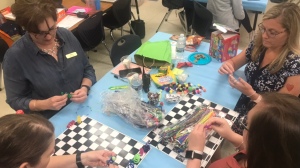Take Risks Or Go Sell Ice Cream

It is hard to live completely risk averse and even harder to live out our purpose without taking some risks. Tonight, at the end of FBI International, Supervisory Special Agent Scott Forrester (Luke Kleintank) told Special Agent Cameron Vo (Vinessa Vidotto), “If you are not willing to take risks on this job, go sell ice cream.” This was after Cameron had shared she had make some tough calls, taken a risk, and lost a friend in the process of doing the right thing. I guess if someone is risk-averse or prefers a stable and predictable career path, they should consider a job like selling ice cream, where the potential for unexpected challenges or risks is minimal. We must also create environments where it is okay to take risks.
Some leaders have a higher risk tolerance than others. Here’s the balancing act: taking on too much risk can have dire consequences, as can embracing too little risk. As a leader, it is crucial to strike a balance between managing risks and creating an environment that encourages calculated risks and learning from failures. The problem with risk aversion is that it’s stifles those you lead. In this episode of FBI International, Forrester had encouraged Vo to take a case and run with it. She knew she could call and talk things through, which she did, but also knew she had the autonomy to make the risky decisions. While it is important to assess and manage risks to protect the well-being of individuals and the organization, being overly risk-averse can hinder growth, innovation, and personal development. It can discourage individuals from taking on new challenges, exploring creative solutions, or stepping outside their comfort zones.
Tearing Down Fences

You all know I love a good metaphor. I was reminded of a great one while reading What Never Happened: A Thriller, by Rachel Howzell Hall this morning. A reference was made to Robert Frost having said, “Don’t ever take a fence down until you know why it was put up.” Frost was emphasizing the importance of understanding the reasons behind certain boundaries or restrictions before dismantling them. This metaphor encourages thoughtful consideration and analysis before making any changes or decisions. Frost suggested that before we remove or challenge established rules or structures, we should fully comprehend their purpose and potential consequences.

Understanding the intended purpose will give us a better idea of whether the fence is still relevant or if there are alternative solutions. Once we understand the original purpose, we can evaluate whether the metaphorical fence still serves its intended function. This metaphor also reminds us to seek others’ perspectives and opinions on whether the fence should be taken down or challenged. This can help us to make decisions that are made collectively and with a broader understanding of the situation.
Leading Like A Sunflower

Another phrase in What Never Happened: A Thriller, by Rachel Howzell Hall jumped out at me during my reading time yesterday. Aunt Gwen told Coco, “better to be a sunflower instead of babies breath.” This was a great analogy that suggested it is preferable to stand out and embrace individuality rather than blend in and conform to societal norms. Sunflowers are known for their vibrant colors and tall stature, symbolizing uniqueness and confidence. Conversely, baby’s breath is a delicate and common flower often used as filler in floral arrangements, representing conformity and similarity.

Embracing individuality allows us to tap into our own strengths and talents, fostering a sense of confidence and self-belief. Also, by embracing our own unique qualities and expressing them authentically, we are more likely to attract people and opportunities that align with our own true self.
We need to encourage embracing one’s own identity and standing out from the crowd rather than striving to fit in. Standing out from the crowd can inspire others and make a positive impact on the world around you. By being true to ourself, we may encourage others to do the same, creating a ripple effect of authenticity and empowerment.
Don’t Pussyfoot Around

I, for one, really value straightforwardness and honesty, and want others to be clear and direct in expressing their thoughts and opinions. As Machiavelli said, “Declare.” Yesterday while reading the awesome novel, What Never Happened: A Thriller, by Rachel Howzell Hall I came across a line that reminded me of this. The main character of the book, Colette “Coco” Weber, said, “I hate anonymity. Say what you mean. Don’t pussyfoot around.” She was expressing her frustration with people being evasive or indirect in their communication. At that moment in the book, Coco was frustrated with her aunt Gwen beating around the bush and using vague language instead of being upfront. This was a great reminder that when communicating, we need to ensure that our message is clear and to the point. Also, don’t forget that using jargon or ambiguous language can lead to misunderstandings.

In our leadership roles, we need to clearly communicate our expectations for communication within teams, groups, or the entire organization. We need to model and create an environment where everyone can be and is expected to be direct and honest in their communication and emphasize the importance of avoiding misunderstandings.
Forgetting What We Know To Learn What We Think

During a discussion this week, I had a person tell me, “Forget what you know and tell me what you think.” I had to think for a moment and ask the person what she meant. She wanted me to forget what I knew and share more about my personal opinion, not just data and facts. She wanted to hear my thoughts and opinions in order to explore new ideas and perspectives. I’ve got to say this was exhilarating. Sharing our thoughts and opinions opens the door for collaboration and discussion, which can lead to innovative solutions and a deeper understanding of complex issues.
This reminded me that there are times when we should set aside any preconceived notions or biases we may have and instead focus on our own thoughts, opinions, and ideas. This encourages independent thinking and an open mind, allowing for fresh perspectives and innovative solutions to problems. I was also reminded that when we hold on too tightly to what we already know, we limit our ability to learn and grow.
Leading Like A Chess Board

In The Problem of Pain, C. S. Lewis said, “The ability of the chess player to play chess is dependent upon the rigidity of the squares and the board.” The leader is the board and the squares. This was a great metaphor that compared the role of a leader to that of the chessboard and the squares on it. The rigidity of the squares represents the consistency and predictability that a leader should exhibit. Just as the squares on a chessboard remain fixed, a leader’s actions and decisions should be reliable and consistent. This allows team members to trust in their leader’s guidance and feel secure in their roles.

In chess, the squares on the board provide a structure and foundation for the game. Similarly, a leader provides structure and a framework within an organization or group. They create an environment where their team members can operate and collaborate effectively. The rigidity of the squares in a chessboard can symbolize the structure and order that a leader brings to an organization or group. Just as each square has a specific position and role on the chessboard, a leader sets clear expectations and assigns roles and responsibilities to each team member. This helps create a sense of order and accountability within the organization.
The rigidity of the squares refers to the stability and consistency of the leader’s approach and decision-making. Just like a stable and well-structured board is essential for playing chess, a leader’s consistency and clarity in their actions and decisions are crucial for their team’s success.
All of this highlights the importance of a leader’s role in providing structure, stability, and consistency to enable their team members to perform at their best.
Balancing Respect & Friendship

Over the weekend I heard a person describe herself as being no one’s friend, but having everyone’s respect. I don’t know the person so I don’t know if the statement is true or not. What I do know is that the idea of having no friends but having everyone’s respect really made me think about whether that would work at all. As a person who believes that relationships trump all, I believe it is important for a leader to build positive relationships in order to foster collaboration and trust. Understandably, prioritizing respect allows the leader to maintain objectivity and make decisions that are in the best interest of the group or organization, without being influenced by personal relationships. Even so, striking a balance between respect and friendship can be key to effective leadership.
The Frictionless Experience

I was reading an article, “What Smart Companies Know About Integrating AI: Talent and Data are Just As Important as Technology,”this week in Harvard Business Review last night related to artificial intelligence (AI). It was interesting to contemplate the idea of a “frictionless experience.” Having a frictionless experience means having a smooth and seamless interaction or process without any obstacles or difficulties. This is the customer experience (CX) at its best. We as consumers expect the same level of service, understanding of our needs, and prompt resolution of our issues across all channels. If we are to take a customer-centric approach we need to be able to personalize at every touch point. I really believe this is also true when working with our students and families in our schools. This relates to all the various aspects, such as customer/student services, user interface design, or even personal experiences. It means that everything flows effortlessly and efficiently, making it easy and enjoyable for every person involved.
AI can also analyze user data to personalize interactions and tailor recommendations, making the experience more relevant and personalized. Additionally, AI can automate repetitive tasks and streamline processes, saving time and reducing the chance of errors. One of the big points of the article was that AI does not replace people, but better informs the people who will be doing the inventing, creating, and innovating. It is about the talent using the data.
I also think about how AI-powered chatbots could be used to tutor and help students. Chatbots can provide personalized learning experiences by assessing the student’s needs and adapting the content accordingly. Not to mention the big support to students, this could be of huge help to teachers by providing both a time-savings and important data. The Chatbots could answer questions, provide explanations, and offer additional resources to support the student’s learning journey. Notice I am suggesting giving additional support – not replacing teachers or existing support. Those same Chatbots can also track the student’s progress, provide feedback, and suggest areas for improvement. With their availability 24/7, chatbots can provide continuous support and enhance the learning experience for students. Wouldn’t it then be amazing to get that report of what questions were being asked and what I, as the teacher, needed to go back and provide more learning on. This could be incredible for a frictionless student experience.
Learning By Falling

I am just about finished reading The Pilgrim’s Regress by C. S. Lewis. It is a fascinating book that has had me thinking and reflecting the entire time I have been reading it. Today while reading one of the characters, History, told John that the person who tries to learn to skate without falling down ends up falling down as much, or more, as anyone else learning to skate, but never really learns how to skate in the end. Genius, right? This goes right along with it being hard to win if you are playing not to lose. We must understand that falling is a part of skating, so we need to stop worrying so much about it happening and just skate.

No one wants to fall while skating and possibly get hurt, but the fact is, the more times we fall, the better we get at recovering, and the less painful it becomes. We need to focus more on what we want to happen, the successful outcome. No matter what we are learning to do, we need to visualize ourselves succeeding, over and over again. When learning skating, or anything new we need to be skating without pressure, without winning or losing. To learn to skate, or again do anything, we must get up after a fall. We can’t learn without falling sometimes – or often.
Brinkmanship

In a meeting this week, the posturing (as I call it) going on in Congress over the proposed education budget was being discussed. The House version has stripped some very important programs like Title I and Title II and comes in at around $67B. Whereas, the Senate version keeps those programs, increases funding for career and technical education and apprenticeships, and comes it at $79B. The correct terminology would be that there might be some brinkmanship going on. Brinkmanship refers to the tactic of pushing a situation to the brink of disaster in order to achieve a desired outcome. It can be seen as both good and bad, depending on the context and how it is used. In diplomacy and negotiations, brinkmanship refers to the tactic of pushing a situation to the brink of disaster in order to achieve a desired outcome.
If there is brinkmanship going on in relation to the education budget it is a risky strategy, as it may lead to increased tensions, conflict, or even harmful consequences. A careful assessment of the risks and benefits of engaging in brinkmanship is important. Understanding the potential costs and consequences of the actions need to be contemplated to make informed decisions and choose the most effective strategies. The other thing that bothers me is the question of how much money is being spent on lobbying for something that in reality, might not even need to be lobbied for. This seems like a huge waste of time and money that could be used in more productive ways.
I get it. Brinkmanship is a necessary tool. It concerns me that sometimes we overuse it. There are those things that might argue that brinkmanship is unethical because it involves intentionally pushing the limits and risking potential harm or conflict. Others, on the other hand will argue that it can be seen as a necessary tactic in certain situations to protect national interests or enforce boundaries. I just hope that we consider the unintended consequences of posturing and brinkmanship.
leave a comment